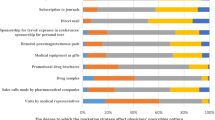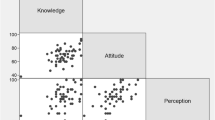Abstract
Objective
Drugs, as commercial products, are subject to diverse marketing methods including promotional activities. Although the legal/ethical aspects of promotional activities have been discussed in a limited manner, the patient has remained the neglected variable of this equation. The goal of our study, therefore, is to investigate the patients’ opinion on the promotional activities of pharmaceutical companies.
Method
A descriptive study was conducted at 44 primary health care centers in Turkey and 584 volunteers who applied to these centers were included. A questionnaire consisting of 42 questions was developed with demographic information in the first section, and drug ads and promotions included in the second section. Chi-square test and logistic regression analysis were used for statistical analysis.
Main outcome measure
The awareness and ethical evaluation of patients of the promotional activities.
Results
Nearly 83% of the participants were aware of the promotion issue. Eighty percent found it unethical, 82% suggested that promotional activities should be forbidden, restricted or regulated. 1/3 of the participants believed that physicians made their drug choices based on the gifts and ads of pharmaceutical companies. Half of them had low confidence in the prescriptions of physicians who accepted gifts from the pharmaceutical companies. 54.5% of patients also considered promotional activities as a factor which increased drug prices.
Conclusions
In our study, a considerable number of patients were aware of promotions and the effects of promotion on prescriptions. The findings of our study may contribute to the development of effective regulations on this issue. Very strict measures controlling drug companies’ promotion activities must be formulated. Further, these regulations must incorporate and take into consideration the patients’ opinion. Today, the basic need for the proper use of drugs does not rest in pharmaceutical promotion, but in providing adequate health services and effective education for both people and physicians.
Similar content being viewed by others
References
Windmeijer F, de Laat E, Douven R, Mot E. Pharmaceutical promotion and GP prescription behaviour. Health Econ 2006;15:5–18
Jureidini J, Mansfield P. Does the drug promotion adversely influence doctors’ abilities make the best decision for patients. Aust Psychiatry 2001;9:95–9
CAM Group. Promotional activity. CAM Group News 2005;4:1. http://www.cam-group.com/www_assets/pages/basic- download/CAMNewsletterQ403.pdf (20 November 2005)
Şemin S, Aras S. İlaç ve Promosyon (Pharmaceuticals and promotion). Toplum ve Hekim 2005;19:350–8
Families USA. Profiting from pain: where prescription drug dollars go? Publication No: 02-105, 2002. http://www.familiesusa.org/site/DocServer/PPreport.pdf?docID=249 (21 December 2003)
Mintzes B. Blurring the boundaries: new trends in drug promotion. Health Action International, 1998. http://www.haiweb.org/pubs/blurring/blurring.intro.html (15 April 2005)
Guldal D, Semin S. The influences of drug companies’ advertising programs on physicians. Int J Health Serv 2000;30:585–95
Ziegler MG, Lew P, Singer BC. The accuracy of drug information from pharmaceutical sales representatives. JAMA 1995;273:1296–8
Katz D, Caplan AL, Merz JF. All gifts large and small. Am J Bioeth 2003 Summer;3:39–46
Wazana A. Physicians and the pharmaceutical industry: is a gift ever just a gift? JAMA 2000;283:373–80
Ma J, Stafford R, Cockburn L, Finkelstein SA. Statistical analysis of the magnitude and composition of drug promotion in the United States in 1998. Clin Ther 2003;25:1503–17
World Health Organization. The world medicines situation, 2004. http://www.who.int/medicines/information/infnews2. shtml (23 October 2005)
Wager E. How to dance with porcupines: rules and guidelines on doctors relations with drug companies. BMJ 2003;326:1196–207
Ministry of Health Turkey. Regulation regarding the promotion of medicinal pharmaceutical products for human use the official Gazette of Turkish Republic, 2003; 25268
Kanavos P, Üstel İ, Font JC. Pharmaceutical reimbursement policy in Turkey. New hope in health foundation, 2005. http://www.suvak.org.tr/eng/default.asp?sayfa=toplanti_raporlar_ eng.htm
Yiu L, Çelik Y, Şahin B. Healthcare and pharmaceutical spending in Turkey. New hope in health foundation, 2005. http://www.suvak.org.tr/eng/default.asp?sayfa=toplanti_raporlar_ eng.htm
Gibbons RV, Landry FJ, Blouch DL, Jones DL, Williams FK, Luccy CR, et al. A comparison of physicians’ and patients’ attitudes toward pharmaceutical industry gifts. J Gen Intern Med 1998;13:151–4
Yapraklı M. İlaç pazarlamasında yöntemler. (The methods for pharmaceutical marketing) İnönü üniversitesi Sosyal Bilimler Enstitüsü. Bilim Uzmanlığı Tezi, Malatya, 2002
Blake RL Jr, Early EK, Patients’ attitudes about gifts to physicians from pharmaceutical companies. J Am Board Fam Pract 1995;8:457–64
Robinson AR, Hohmann KB, Rifkin JI, Topp D, Gilroy CM, Pickard JA, et al. Direct-to-consumer pharmaceutical advertising: physician and public opinion and potential effects on the physician–patient relationship Arch Int Med 2004;164:427–32
Berndt ER; To inform or persuade? Direct-to-consumer advertising of prescription drugs. N Engl J Med 2005;352:325–8
Wirth M, Scherer D. Patient’s perceptions of doctors’. Relationships with pharmaceutical companies. Healthy skepticism. International 2002; 20. www.healthyskepticism.org (18 April 2005)
Acknowledgements
The authors want to thank Sahbal Aras, Cengiz Çelikoğlu, Yücel Demiral, Belgin Unal, and Aksel Epik for their assistance with this manuscript.
Funding: A research grant from the Dokuz Eylul University, Turkey (04.KBS.011).
Author information
Authors and Affiliations
Corresponding author
Rights and permissions
About this article
Cite this article
Semin, S., Güldal, D., Özçakar, N. et al. What patients think about promotional activities of pharmaceutical companies in Turkey. Pharm World Sci 28, 199–206 (2006). https://doi.org/10.1007/s11096-006-9032-8
Received:
Accepted:
Published:
Issue Date:
DOI: https://doi.org/10.1007/s11096-006-9032-8




